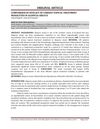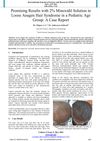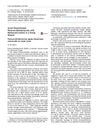 153 citations,
March 2017 in “Endocrine”
153 citations,
March 2017 in “Endocrine” Male pattern baldness involves genetics, hormones, and needs better treatments.
[object Object]  143 citations,
October 1996 in “Dermatologic Clinics”
143 citations,
October 1996 in “Dermatologic Clinics” Too much androgen can cause hair loss; finasteride may help.
 105 citations,
January 2009 in “Medicine”
105 citations,
January 2009 in “Medicine” Hirsutism is more linked to high androgen levels than acne or hair loss, and a mix of hormonal tests is best for diagnosis; certain treatments can reduce symptoms.
 89 citations,
September 2010 in “Annual Review of Genomics and Human Genetics”
89 citations,
September 2010 in “Annual Review of Genomics and Human Genetics” The document concludes that understanding the genes and pathways involved in hair growth is crucial for developing treatments for hair diseases.
 68 citations,
March 2018 in “Biomaterials”
68 citations,
March 2018 in “Biomaterials” Tiny needles with valproic acid can effectively regrow hair.
 68 citations,
March 1965 in “The BMJ”
68 citations,
March 1965 in “The BMJ” Hormones and genetics affect hair growth and patterns, with some changes reversible and others not.
 56 citations,
January 2021 in “Clinical and Experimental Medicine”
56 citations,
January 2021 in “Clinical and Experimental Medicine” The document concludes that while there are various treatments for Alopecia Areata, there is no cure, and individualized treatment plans are essential due to varying effectiveness.
 48 citations,
June 2013 in “Journal of Dermatological Science”
48 citations,
June 2013 in “Journal of Dermatological Science” Valproic acid may help hair grow and could be a safe treatment for hair loss.
 37 citations,
February 2014 in “Journal of Dermatology”
37 citations,
February 2014 in “Journal of Dermatology” Valproic acid increases hair count in men with hair loss.
 33 citations,
August 2018 in “Facial Plastic Surgery Clinics of North America”
33 citations,
August 2018 in “Facial Plastic Surgery Clinics of North America” The document explains hair biology, the causes of hair loss, and reviews various hair loss treatments.
 24 citations,
January 2020 in “International Journal of Molecular Sciences”
24 citations,
January 2020 in “International Journal of Molecular Sciences” Some plants with flavonoids may help treat hair loss and promote hair growth.
 16 citations,
January 2006 in “The Aging Male”
16 citations,
January 2006 in “The Aging Male” Hormone imbalances can cause skin diseases, and understanding these links is important for diagnosis and treatment.
[object Object]  14 citations,
April 2014 in “Medical Clinics of North America”
14 citations,
April 2014 in “Medical Clinics of North America” The document concludes that quick referral and appropriate treatments are crucial for managing common skin conditions and preventing permanent damage.
 13 citations,
March 2020 in “Genes”
13 citations,
March 2020 in “Genes” Disrupting the FGF5 gene in rabbits leads to longer hair by extending the hair growth phase.
 10 citations,
February 2015 in “Clinics in Dermatology”
10 citations,
February 2015 in “Clinics in Dermatology” The document concludes that changes in eyelashes and eyelid skin can indicate various local and systemic diseases.
 9 citations,
April 2018 in “JAMA Dermatology”
9 citations,
April 2018 in “JAMA Dermatology” Topical minoxidil improves hair loss in 80% of women with breast cancer undergoing endocrine therapy.
 9 citations,
March 2001 in “Clinics in dermatology”
9 citations,
March 2001 in “Clinics in dermatology” Hirsutism in women is often due to hormone sensitivity and has significant psychological effects.
 8 citations,
January 2020 in “Skin Pharmacology and Physiology”
8 citations,
January 2020 in “Skin Pharmacology and Physiology” Caffeine improves hair growth, thickness, and reduces shedding.
 5 citations,
January 2018 in “Springer eBooks”
5 citations,
January 2018 in “Springer eBooks” Acne in dark skin is influenced by environmental factors and can lead to hyperpigmentation, with various treatment options available.
 4 citations,
April 1999 in “Dermatologic Clinics”
4 citations,
April 1999 in “Dermatologic Clinics” Androgens, like DHT, affect hair growth and treatments like finasteride may help.
 1 citations,
May 2021 in “Journal of Cosmetic Dermatology”
1 citations,
May 2021 in “Journal of Cosmetic Dermatology” Cosmetic foam product reduces hair loss and increases hair density in men.
 1 citations,
October 2018 in “InTech eBooks”
1 citations,
October 2018 in “InTech eBooks” The document concludes that treatments for cicatricial alopecia are not well-supported by evidence, but hair transplantation shows more predictable and satisfactory results.
 1 citations,
February 2015 in “Journal of evolution of medical and dental sciences”
1 citations,
February 2015 in “Journal of evolution of medical and dental sciences” 0.05% Betamethasone Dipropionate is the most effective topical treatment for alopecia areata.
 1 citations,
November 2014
1 citations,
November 2014 The document explains hair and nail biology, common hair loss conditions and treatments, oral and genital skin diseases, and the risks and treatments associated with squamous cell carcinoma.
 May 2023 in “International journal of science and research”
May 2023 in “International journal of science and research” 2% minoxidil solution improved hair density and quality in children with Loose Anagen Hair Syndrome.

Researchers found a genetic link for hereditary hair loss but need more analysis to identify the exact gene.
 October 2015 in “Elsevier eBooks”
October 2015 in “Elsevier eBooks” Minoxidil is effective for hair growth and safe for long-term use.
 July 2015 in “Actas Dermo-Sifiliográficas”
July 2015 in “Actas Dermo-Sifiliográficas” A young woman with a rare fungal infection showed significant improvement after treatment with antifungal medication.
1 citations,
January 2022 in “Journal of Drug Delivery Science and Technology” The optimized microemulsion with cinnamon oil effectively delivers finasteride through the skin without damaging hair.
 April 2024 in “Journal of endocrinological investigation”
April 2024 in “Journal of endocrinological investigation” Topical minoxidil helps transgender individuals assigned female at birth grow more facial hair.





























